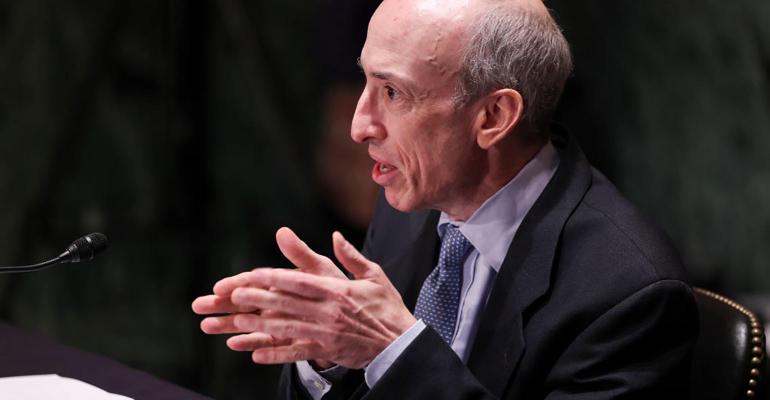SEC commissioners voted 4-1 in favor of proposed amendments to the commission's custody rule that would expand the rule’s scope to encompass more client assets, including more crypto.
The proposal would broaden the reach of the original 1962 rule by applying it beyond client funds and securities to “any client assets in an investment adviser’s possession” or when the advisor has the authority to obtain client assets. The rule last was updated in 2009 in the wake of a series of public scams, including the Bernie Madoff fraud.
“Since the current custody rule was last amended in 2009, changes in technology, advisory services and custodial practices have created new and different ways for client assets to be placed at risk of loss,” a fact sheet detailing the proposed changes read.
The five commissioners discussed their thoughts on the amendments during an open meeting Wednesday morning. Commissioner Caroline Crenshaw supported the changes, saying they would mean the custody rule would apply to all assets over which an advisor could have custody, without favoring or discouraging one asset over another.
“No matter how bold or different the investment landscape may look in the future, the custody landscape must stand un-weathered as the promise that investor assets are safeguarded against misuse and misappropriation,” Crenshaw said.
According to the commission, the amendments would continue to require advisors to maintain client assets with a qualified custodian (defined in the fact sheet as generally “a federal or state-chartered bank or savings association, certain trust companies, a registered broker-dealer, a registered futures commission merchant or certain foreign financial institutions”).
The rules would require an advisor to have a written agreement and “obtain certain reasonable assurances” from qualified custodians to make sure client assets have certain protections, including segregating the assets to protect them if the qualified custodian goes bankrupt. The amendments also would change the current rule’s exception for certain privately offered securities.
Commissioner Hester Peirce was the lone dissenter and worried that the proposal threatened to expand the reach of custody requirements into crypto assets, while simultaneously shrinking the ranks of crypto custodians that would be deemed “qualified custodians,” potentially leaving crypto assets more vulnerable to theft or fraud. She also questioned the commission’s jurisdiction.
“The commission doesn’t have authority to regulate custodians directly, so are we doing indirectly what we can’t do directly?” Peirce asked. “Given our lack of regulatory authority, who would be on the hook if a qualified custodian failed to satisfy the requirements?”
Speaking in support, Chair Gary Gensler stressed that the rule as it stands already covers many crypto assets, but he cautioned that just because crypto trading and lending platforms claim to custody investors’ crypto, it doesn’t mean they are qualified custodians. Too often, such platforms don’t segregate investors’ crypto properly, according to Gensler.
“When these crypto platforms go bankrupt, investors’ assets have often become property of the failed company, leaving investors in line at the bankruptcy courts,” Gensler said. “Make no mistake; based upon how crypto platforms generally operate today, investment advisors cannot rely on them as qualified custodians with regard to our 2009 rule.”
Though he voted in support of the proposal, Commissioner Mark Uyeda echoed some of Peirce’s concerns, arguing that since crypto assets trade on platforms that aren’t qualified custodians, any trades would violate the proposed rules.
“So, how can an advisor seeking to comply with this rule possibly invest funds in crypto assets after reading this release?” Uyeda asked. “This approach to custody seems to mask a policy decision to block access to crypto as an asset class.”
Nevertheless, executives at some crypto platforms believe their platforms will fall under the qualified definition under the current rule and its proposed revisions; in a Twitter thread on Wednesday afternoon, Coinbase Chief Legal Officer Paul Grewal said that he expected the platform to remain a “qualified custodian” after the changes.
“We support the Commission’s efforts to provide all investors with the protections already available to (Coinbase Custody Trust Co.) clients,” Grewal wrote. “And we fully agree investors deserve to feel confident their assets are safe – as a reminder, our clients’ assets are segregated and secured.”
Like Peirce, Gail Bernstein, general counsel with the Investment Adviser Association (IAA), worried about both the length of the comment period (60 days after the proposal’s publication in the Federal Register) and the compliance period after finalization (one year, or 18 months for advisors with under $1 billion in managed assets).
Bernstein asked whether these were lengthy enough periods for the industry to consider the proposal and to get into compliance, respectively.
“The proposal represents a sea change in the current relationship that clients have with their custodians and the IAA is diving in to understand its implications, especially for smaller advisers that have little leverage to negotiate contracts with specific terms with custodians, especially those not regulated by the SEC,” Bernstein said.





